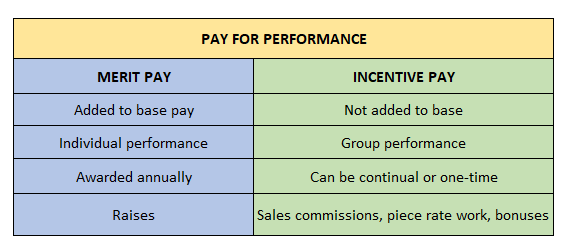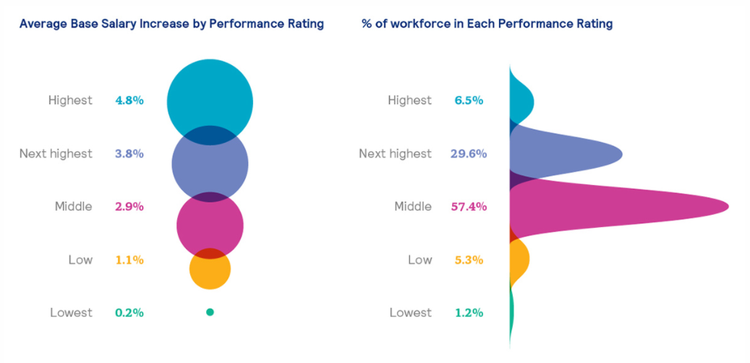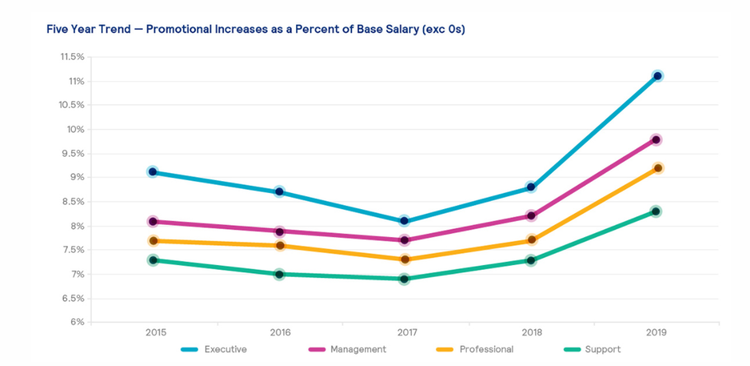Merit pay and other types of performance-based compensation are critical to keeping employees engaged and happy year after year. Yet few companies are happy with their efforts to measure and reward employee performance. In one Deloitte study, 82% of companies reported that performance evaluations weren't even worth their time.
While performance reviews are a matter of ongoing dispute and experimentation, companies recognize the need to connect pay to performance. So merit-based pay, largely in the form of the annual 3% salary raise, lives on as a staple of talent management.
Is the annual salary bump underperforming? Should your small business look for a more innovative approach to paying for performance? Here are some merit pay advantages and disadvantages to consider as you look for the optimal pay program for your company.
Overview: What is merit pay?
Merit pay is a salary increase given to reward individual performance. Merit pay is a type of pay for performance (PFP), which is used more broadly to describe any pay based on employee performance.
Merit pay is often used interchangeably with incentive pay, but they're different. Incentive pay is a bonus based on team or company performance. It may be awarded continually or periodically. Examples of incentive pay include sales commissions, bonuses, profit sharing, and piece-rate pay.
Incentive payouts are typically larger than merit pay increases. They can be awarded to hourly or salaried employees.
Here's an illustration of the differences:

Merit pay and incentive pay are both types of pay for performance. Image source: Author
A study by researchers at the Wisconsin School of Business found that:
- More than 90% of companies use some type of pay for performance.
- The most common types are merit pay (annual increases) and bonuses.
- Both merit and incentive pay improve employee performance.
- Bonuses have a much greater impact on performance than merit pay.
- Performance-based pay has the highest impact in jobs where outcomes are easily measured.
Bonuses and other incentive pay may outperform merit pay because of their size. According to the most recent compensation data from Mercer, incentive or promotional pay averaged 9.3% in 2019, while merit pay averaged 2.9%.

Annual merit increases averaged 2.9% in 2019. Image source: Author
A 10% bonus will grab more attention than a 3% annual salary bump, even though the 3% compounds year after year. Add to that the underwhelming performance of the traditional performance review. Gallup reports they often do more harm than good, and the best path forward is far from clear if you want to incentivize employee performance.
Here are some merit pay pros and cons to consider.
4 advantages of offering merit pay
Merit pay is a staple of employee engagement and performance management. Here are some benefits of including a merit pay plan in your compensation and benefits strategy.
1. Rewards high performers
High performers thrive on results, feedback, and notching wins. They want to see the numbers go up, the project come in early, the five-star reviews roll in. Tying their pay to those results demonstrates the value they bring and drives them to keep excelling. To high performers, the annual performance bonus reinforces their belief that their work matters, and you value it.
2. Connects work to results
To do great things, you must aim for them. A merit pay system provides clear objectives to work toward, keeps employees on track throughout the year, and rewards them when they achieve their goals.
3. Retains good employees
Merit and incentive pay enhance employee satisfaction, engagement, and retention. They are especially important for retaining top performers. Merit pay is also a key factor in recruitment.
4. Enhances performance
A good merit pay program gives employees the tools, incentive, and feedback to strive for results and improvement. That translates to stronger results and a stronger company.
4 disadvantages of offering merit pay
Merit pay also has many drawbacks that can reduce or even erase its benefits. Here are four disadvantages to consider when weighing merit-based compensation.
1. Results aren't always measurable
While some goals can be boiled down to measurable key performance indicators (KPIs), many aspects of performance are subjective. Soft skills such as communication and teamwork are not measurable, yet they're just as critical to your company's success as technical competence. Finding objective ways to reward those skills can be challenging.
2. Performance is subjective
Employee performance is even harder to properly quantify and measure. All too often, employees feel their ratings are arbitrary, inaccurate, or unfair. Inconsistency from manager to manager can further call the fairness of your system into question.
Many companies have addressed this by eliminating numeric ratings from performance evaluations, but the bottom line still comes down to numbers when you translate all that feedback into merit-based raises.
3. It can create tunnel vision
Merit pay can encourage employees to focus too tightly on the goals they're being rewarded for. This can limit their ability to explore new ideas and develop their full potential. For example, a shop floor supervisor whose merit increases are tied to productivity could overlook opportunities to improve safety or quality.
4. Rivalry is inevitable
Competition can be healthy. It can also destroy a team or a department. An annual trip to Cancun for your top salespeople is great, but employees who miss the mark may feel cheated. Is their territory less desirable? Are they getting an even chance at the best leads? Even private performance reviews can become a point of contention if employees compare notes on their raises. We're only human; coming in second, or tenth, hurts.
On the flip side, rewarding poor performers at the same level as other employees can demotivate high achievers.
Nobody said this would be easy.
Is merit pay right for your business?
Studies confirm merit pay and other PFP programs can improve employee performance, so, imperfect as it may be, linking pay to performance makes sense. And with 90% of companies offering annual merit increases, skipping them could damage your ability to recruit and retain top performers.
So how can you reap the benefits of performance-based pay without cries of unfairness?

Promotional increases or incentive pay averaged 9.3% in 2019. Image source: Author
9 merit pay system best practices
Here are best practices for a merit pay system that will work for your company and staff.
1. Focus on measurable goals
Tying employee goals to company performance is a proven tactic for enhancing performance and building faith in your pay practices. Use measurable KPIs where you can. For example, instead of rating customer service from "outstanding" to "needs improvement," you could set a bar for positive reviews received or tickets closed within 24 hours.
Your system won't be perfect -- they never are -- but the more you can connect performance to measurable company goals, the better it will be received.
2. Provide coaching
Are you investing in employee training and development? Employees want to learn and grow at work. Giving them opportunities to upskill and improve is critical to helping them achieve company goals.
3. Give continual feedback
Performance reviews should consist of a cycle of check-ins and feedback throughout the year, not just an annual summit. Employees who receive frequent feedback are more likely to stay on track and to feel their reviews are fair.
4. Train managers
Managers also need coaching and development. Many front-line supervisors are promoted into those positions with little experience in performance management, yet they're the foundation of your program. Make sure your leaders are equipped to use your pay program consistently and fairly to drive their teams' performance.
5. Calibrate your pay system
If your pay system is too complex, it will be cumbersome to administer and confusing to employees. Focus on a handful of goals to connect to compensation.
Your pay scales and raises also need to be finely calibrated: differentiated enough to reward high performance, yet not so broad as to feel unfair.
6. Involve employees
Involving employees in setting goals and KPIs for their positions encourages buy-in to your performance management system. It's also a great strategic exercise.
7. Build in flexibility
As with any human resource (HR) practice, your system needs enough flexibility to allow for manager discretion.
8. Consider alternative plans
Some companies have implemented innovative variable compensation plans in lieu of simple merit awards. Here are some examples from a recent Society for Human Resource Management (SHRM) symposium:
- Annual merit raises plus quarterly bonuses
- Set salary increases based on company-wide performance
- No merit increases, with periodic market adjustments to pay as warranted
- Variable pay based on job level, from 35% to officers to 8% for support staff
- Incentive awards whenever employees go above and beyond
9. Use software
Using HR software such as Zoho People to administer pay and performance management can save managers and HR staff time on routine paperwork. It can also enhance the accuracy and fairness of your performance review system. Software makes it easy to send out surveys and gather feedback efficiently.
HR software can also provide workforce analytics and other insights to inform your pay strategies.
Merit pay has its merits
For all the talk about ditching performance reviews and annual merit increases, it's hard to imagine a system to connect pay with performance that doesn't rely on some version of these time-tested practices. But those tools are yours to adapt to fit your company's unique culture and goals. The key is to get input from your staff, look for new ideas, and keep on tweaking until your system truly serves your employees and your company.
Our Small Business Expert
We're firm believers in the Golden Rule, which is why editorial opinions are ours alone and have not been previously reviewed, approved, or endorsed by included advertisers. The Ascent does not cover all offers on the market. Editorial content from The Ascent is separate from The Motley Fool editorial content and is created by a different analyst team.